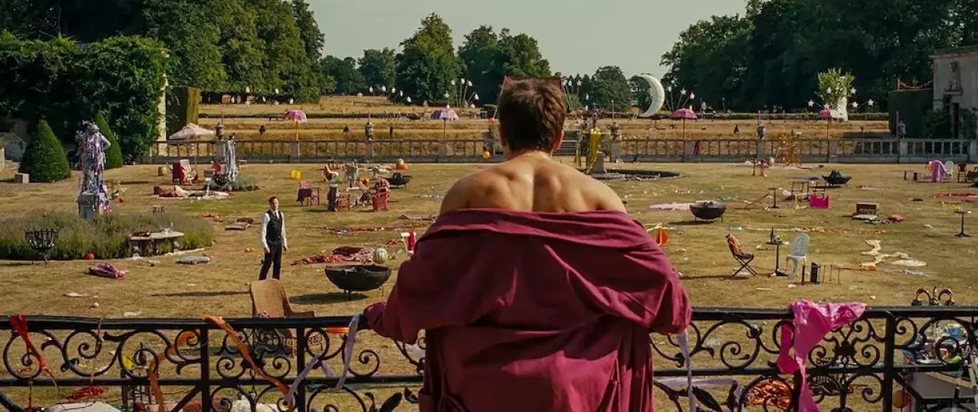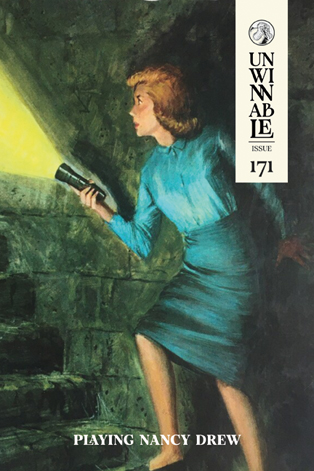
Sex and Cinema

This column is a reprint from Unwinnable Monthly #171. If you like what you see, grab the magazine for less than ten dollars, or subscribe and get all future magazines for half price.
———
Kcab ti nur.
———
Happy New Year! We’ll be back to big jumps and long travels soon, but let’s take a moment and reflect on the year gone by. Many threads move through the year, but the one that I want to hone in on is sex. Its regulation dominates legislation, particularly concerning queer people, and it also looms large over discussions of culture. At the same time as a quasi-accepting era which brings us more art focused on marginalized people, a soft Hayes Code re-emerges, allowing for the clean lines of queerness but not the smudges.
As forewarning – this piece will involve discussion, but not description, of sexual violence.
The main focus here is going to be on two films which purport to challenge our particular status quo with stark different results, Saltburn and May December. The former film follows Oliver Swift (Barry Keoghan) as he spends a summer at Saltburn Manor at the request of Felix (Jacob Elordi) and gets more enmeshed in their lives. The latter follows actor Elizabeth (Natalie Portman) as she follows Gracie (Julianne Moore) and her husband Joe (Charles Melton), whom Gracie assaulted as a minor and then married after she had his children in prison, in preparation to play the now-free older woman in a film.
The Anglosphere is obsessed with sex but also terrified of it. Celebrities and advertisers sell sex in the abstract, but sex workers face heightened pressure, being pushed into working in more dangerous ways to avoid prosecution. Sexual education exists as a battleground for control over the sexual agency of upcoming generations. This puritanical fixation renders queer bodies as inherent threats. It’s what puts drag story time at the center of public debate in a society that refuses to handle the causes and venues of harm that don’t make a good tabloid headline.
In cinema, it continues to be the case that sexual content is treated more harshly than violence when it comes to ratings, limiting audiences for pictures with that content. The most popular film franchise of the past decade is near sexless. The screen’s constrained just like the world around it.

Saltburn frames itself as a sort of bulwark against this timidity of contemporary context, a controversial picture that pushes boundaries. And it certainly does do that in some ways, social media is filled with people having stark reactions to the film (in various directions) and critics (myself included) have loud diverse opinions. Also, its sex scenes push further than what is typically expected of contemporary film. However, the way they’re shot betrays a prudishness at work. The scenes are all shadow and implication, with the focus tight on the faces. There’s little tangibility to it and while these actors are working hard with the material, few have chemistry. It is also true that “Dark Romances” are some of the most popular books of our time and have been semi-mainstream since Fifty Shades of Grey exploded – so this is perhaps not as outsider-y as we would be led to believe.
What also reinforces these issues is despite the empty attempts at homoeroticism that heavily rely on Jacob Elordi being conventionally attractive – there is only one gay sex scene on the screen and it’s an assault. To understand gay adult sexuality as largely insincere and solely connected to violence and domination is just the other side of the coin of an artistic sphere that produces Heartstopper as the most popular representation of queer culture while outsider work doesn’t get proper support and funding. Gayness must exist in soft fantasy space or not at all. Elordi’s Felix only remains angelic because he does not sully himself in the muck of tangible gay realities.
By contrast, Haynes and Burch unpack the culture of transgressions that Saltburn rattles the cage of. This film is intentionally littered with sexual harms that no-one even blinks at. First of these is when Gracie’s ex-husband was a college student who started dating her when she was in high school and no-one on screen even blinks. Gracie perpetuates a string of manipulations towards Joe, and the violence of these is shown by the film through Melton’s sharp shifts into childlike body language, but again none of these characters note it. Even Gracie’s initial public crucifixion is not interested in the harm done to Joe, but instead the scandal of it all, the tabloid/true-crime drama of the psychology of someone who did such a taboo act, and the melodrama of her giving birth to twins in prison. She becomes a pantomime villain. What’s important to note here is that part of what enables the pushing of Joe to the edge of the frame is his specific position as a man of color. Fennell’s Saltburn ends up embodying the approach Haynes is critiquing with its treatment of the sexual assault of Farleigh – the one person of color present in the Saltburn manor.

Men of color and the sexual threat attached to them have been a persistent anxiety in societal understandings of sex. There’s a clear double bind here where these men are both objects of disgust and objects of desire – but always objects.
In the midst of Swift’s rise to power, Farleigh (Archie Madewe) publicly humiliates him to take him down a peg and then in response Swift rapes him. The scene is shot in a way that’s meant to be reminiscent of the earlier point where he has consensual sex with India (Millie Kent), one of the scions of the Saltburn estate.
There is potency in exploring the complexities of sex and power along race and class lines on screen. I also want there to be space for explorations of the blurred lines of kink, consent, violence, fantasy and more. Films like Rodrigues’ Will-o’-the-wisp and Fassbinder’s Querelle tackle these themes with varying levels of success. The problem is Fennell has no interest in the exploration of the image of rape and racial domination that she invokes, it’s just a throwaway to shock and scandalize. While Swift’s manipulative but ultimately consensual sexual encounter with India is returned to via cutting glances and spiteful monologuing, the rape of Farleigh is pretty much ignored in screenplay, direction and performances. He is just an object through which Fennell can show how “crazy”/dangerous/sexy her white lead is. This is something that feels particularly gross from a director whose last picture was about dealing with the aftershocks of rape.
At face value, it seemed like May December might have done the same. Its initial marketing campaign is predominantly focused on Natalie Portman and Julianne Moore not Melton (who plays the CSA survivor). But as we move through the film and unpeel the layers it becomes clear that this is Melton’s movie as much as it is Portman and Moore’s. Joe is understood as a sexual object by both Gracie and Elizabeth, and the racial dynamic here is key. It’s most glaring the one-time Joe and Gracie have a proper argument, with her declaring that he was “the boss” and in charge when she assaulted him (pulling from an interview with Mary Kay Letourneau and Vili Fualaau who serve as loose inspiration for the film). This is what happens to boys of color, they get their childhood stripped away for the use of the white people that surround them. These are also some of the people forgotten in reductive white feminist narratives. However, in Melton’s detailed performance increasing time alone in the frame as the film goes on, Haynes is rejecting that objectification and allowing him to be embodied.

This is a luxury often not afforded to people of color in our contemporary fixation on true crime – especially when it contains a scandalous sexual element. Ryan Murphy’s Dahmer series certainly couldn’t afford the man’s victims that courtesy, instead keeping their selfhood and agency fairly limited. The one big exception, Tony Hughes was still a little weakly embodied as his life was understood through pity related to his deafness.
Saltburn is a deeply referential text but never supersedes what it pulls on, especially not regarding discourses around sex, there’s less being said about the relationship between class or masculinity and sex here than is said in media like Brideshead Revisited or The Talented Mr. Ripley that are being ripped from here. Fennell performs endless invocations but lacks the direction which cemented that art in the cultural memory. It would be unfair to ask Fennell to be as skilled as those forebearers (or Haynes) on her second feature, but it is reasonable to expect an aim at something more inspired than what we get.
In May December, the relationship to the metatext feels far more intentional. Haynes’ film feels directly in conversation with the true crime fascination that continues to produce documentary after documentary and podcast after podcast. Portman’s actress Elizabeth follows the steamy tabloid version of the story, the one full of hormones and overdone impressions, instead of seeing the multifaceted power dynamics at play. She is a character study in the sort of empty and unthinking cruel detachment that telling these stories without meaningful empathy or purpose produces. There’s a real deftness with how specifically Burch’s screenplay pulls on real-life moments at some points and leans out of them in others that allows the sharp cultural critique.
In the end, I’m glad we have gotten some films that are semi-popular and trying at least a little to break past pallid monotones. But I want artists to make work that breaches the real boundaries, without discarding people of color along the way. The only way to find out is by waiting and seeing so come through 2024!
———
Oluwatayo Adewole is a writer, critic and performer. You can find her Twitter ramblings @naijaprince21, his poetry @tayowrites on Instagram and their performances across London.




